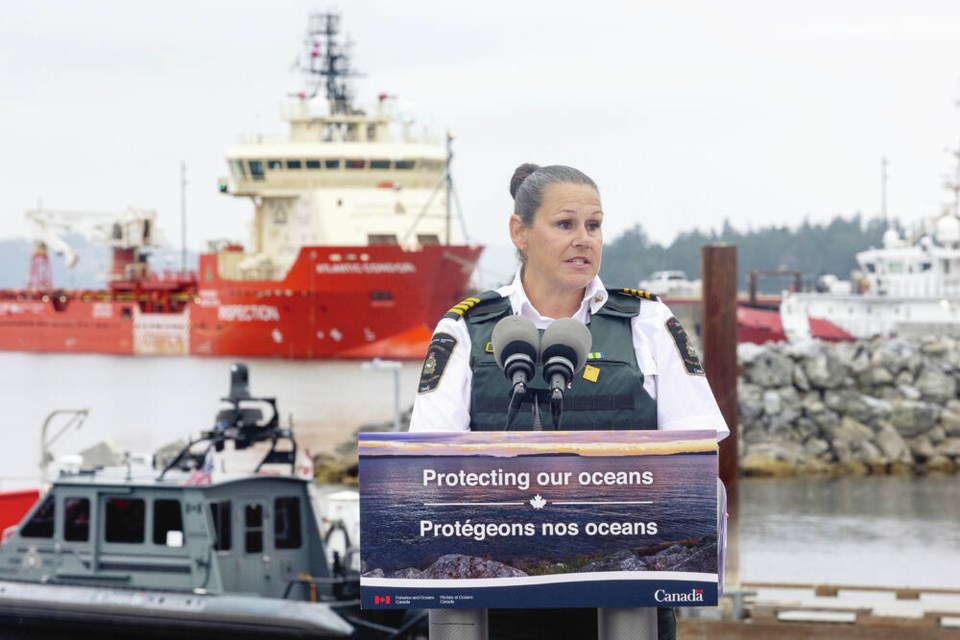Dustin De Gagne will say goodbye to his wife and three daughters this morning and board a ship in North Saanich that will take him out on the high seas for a month.
The mission: find international fishing fleets, board the vessels and check their catches.
The Department of Fisheries and Oceans is taking a lead role for the first time in patrolling about 30 million square kilometres of open ocean in the North Pacific to combat illegal, unreported and unregulated fishing — a formidable task.
It’s part enforcement and part research, as 28 crew members, including DFO fisheries personnel and members of the Canadian and U.S. coast guards, board a contracted ship, Atlantic Condor, for patrols that will continue in month-long shifts through to the late fall.
The idea is to collect data along the way on the range of Pacific salmon stocks, and find and deter anyone from catching those species, as well as others such as sharks that have been devastated through fin harvesting.
De Gagne has been on the patrols before with the U.S. Coast Guard out of Japan, but it’s the first time he’ll do so as part of a Canadian lead.
“This is a big responsibility for us,” said De Gagne. “It’s important as Canadians we lead this and protect the fish, especially the salmon.”
He said in 2019, he encountered several ships on the open ocean with undernourished crews living in unsanitary conditions and paid poorly who stay on board for up to a year at a time.
He said although looking for poor working conditions won’t be part of this mission, Canada is collaborating with other countries on labour standards for workers aboard the vessels.
The 73-metre Atlantic Condor, a Dartmouth, N.S.-based transport ship that delivered new coast guard lifeboats to the West Coast in 2021, will be the main mission ship. It’s been outfitted with fast boarding vessels that fisheries officers will use, as well as modular offices and new communications gear to support the mission.
Sean Wheeler, chief of international enforcement for DFO, said crews from Atlantic Condor have the legal right to board any vessel they stop on the high seas and inspect for drift nets and other illegal equipment — and to see what they are catching.
Pacific salmon species will be a priority, but all fish catches will be vetted, as stocks are declining globally, he said.
Wheeler said there is no legal fishery for Pacific salmon.
In 2018, U.S.-led crews on similar patrols confiscated 80 tonnes of salmon from a Chinese fishing boat that was using a drift net.
Wes Shoemaker, head of the federal government’s Pacific Salmon Strategy Initiative, said the decline of Pacific salmon over the decades has been blamed on habitat loss, climate change, local overfishing and illegal international catches. However, little is known on the extent of the damage caused by international fleets, or the impact climate has had on salmon life cycles at sea.
Wheeler said part of the mission will involve collecting salmon specimens for genetic testing to determine the range of the species, and if salmon are travelling farther north or east due to warming ocean temperatures that put the salmon in contact with international fishing fleets. He said salmon are sometimes by-catches in netting operations, and DFO is hopeful the missions this summer can put into context the extent of salmon loss to international fleets.
“Salmon don’t know borders, so we can protect some of the measures we’ve taken at home in streams and rivers by making sure they are not caught on the high seas,” he said.
He said the mission, which covers a vast territory, will include help from satellite imagery and aircraft to find concentrations of international fishing vessels, which are likely to include Russian, Chinese, Korean, Taiwanese and Japanese boats, among other countries. Many of the vessels are large factory ships that catch and process fish and stay at sea for months at a time.
Heather McCready, director general of conservation and protection for DFO, said the federal government has been deploying fisheries officers in leading roles off the east coast for more than 40 years, and called the West Coast initiative “the dawn of a new era” in the North Pacific for enforcement.
“This is about rules-based order on the high seas, and Canada is playing a big role,” she said of the mission, dubbed Operation North Pacific Guard.
>>> To comment on this article, write a letter to the editor: [email protected]



